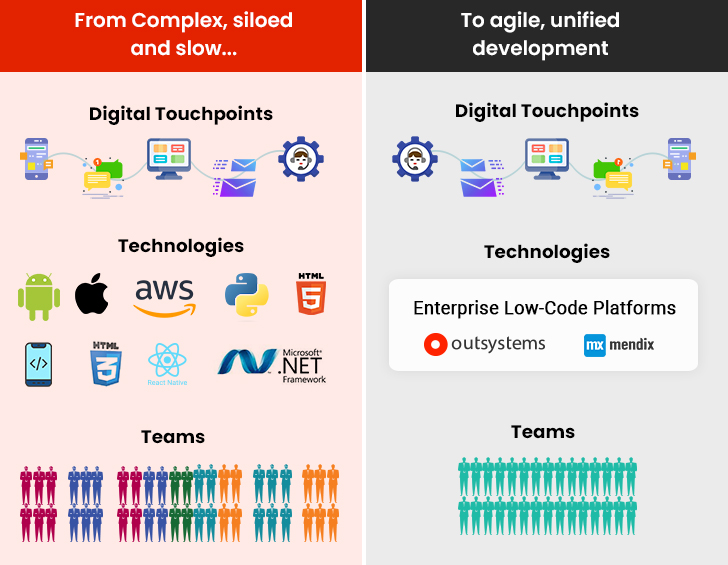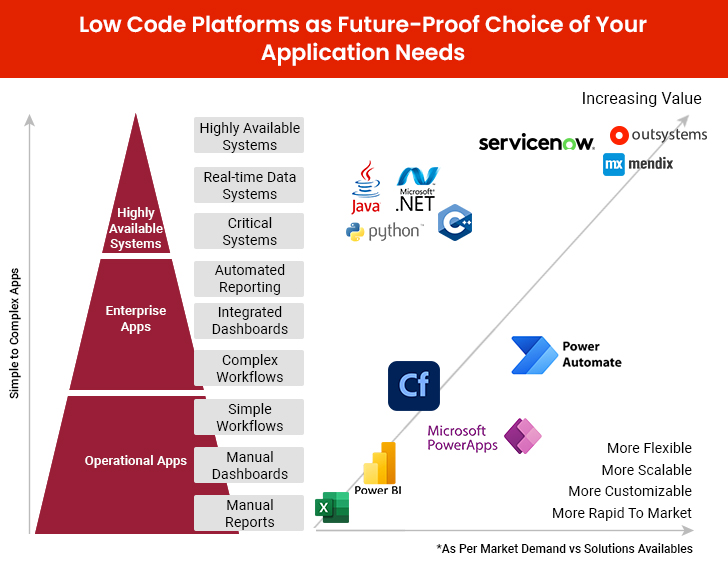If you’re a CIO or CTO evaluating your next business application, you’re probably facing a familiar dilemma: Should we go for custom development or adopt a Low-Code/No-Code (LC/NC) platform?
The answer depends on your business needs, agility requirements, and scalability expectations. While many enterprises prefer custom-built applications to avoid ongoing platform costs, research from Gartner, G2, and KPMG indicates that 76% of apps are now moving toward LC/NC platforms due to speed, flexibility, and built-in monitoring capabilities. But does that mean LC/NC is always the best choice? Not necessarily.
Here’s our balanced perspective on when to go custom vs. when to leverage LC/NC.
When Does Custom Development Make Sense?
Custom development offers two clear advantages: Complete control over your solution and no monthly platform fees to worry about. But let’s be honest – it’s a bigger bite out of your budget upfront, and you’ll need to dedicate your IT team’s time and energy to the project.
So, when does it make sense to build from scratch? I’ve found there are a few key scenarios where it’s worth the investment:
- Single-use case applications: If your organization only needs a static, low-maintenance system (e.g., an attendance tracker), a custom-built app works best.
- Minimal change requests: If business needs don’t evolve frequently, there’s no pressing need for LC/NC’s rapid iteration capabilities.
- Industry-Specific Requirements: If your business operates in a highly specialized domain where off-the-shelf LC/NC solutions don’t fit, custom coding ensures you get exactly what you need.
- Regulatory Compliance & Security: Some industries require highly customized security protocols, which LC/NC platforms may not fully support.
When Should You Choose Low-Code/No-Code (LC/NC)?
If your enterprise deals with agile market demands – where customer demands shift overnight, and workflows need constant fine-tuning – low-code/no-code platforms can provide an edge. These platforms are not just the tools, but accelerators that give you significant competitive advantage. Here’s how they stand out:
- Modernization of Legacy Applications: If you’re moving from outdated systems (e.g., Excel-based workflows) to a scalable, integrated solution, LC/NC speeds up the transition.
- Fast Time-to-Market: Enterprises needing to launch applications quickly—for example, a new customer portal or an internal workflow automation tool—can deploy LC/NC solutions in weeks instead of months.
- Scalability Across Multiple Use Cases: If your organization has multiple business units requiring different applications, LC/NC enables seamless integration and scaling.
- Built-in Governance & Monitoring: High performance, rapid development platforms like OutSystems, Mendix, ServiceNow, etc., come with pre-built monitoring, security, and compliance features—a significant advantage over maintaining these manually in custom-built solutions.
- Working with Multiple Technologies: If you are working with diverse tech stacks, low-code platforms offer powerful consolidation: unified development language, centralized management console, and streamlined team expertise.

Damco empowers businesses with low-code platforms like OutSystems, Mendix, MS Power Apps, and more to ensure faster, scalable, and cost-effective application development.
Understanding Abstraction Levels of Technology Platforms Can Help You Make the Right Decision
Low-Code or Custom Build? Let’s Use Damco’s Decision-Making Framework
Deciding between low-code and custom development can be tricky. That’s why we use a structured framework to make the choice clear. This helps us assess:
- Flexibility: Does your business need high adaptability for new product launches?
- Scalability: Will this application need to expand across multiple teams/functions?
- Customizability: How much control do you need over workflows and integrations?
- Time-to-Market: How soon do you need the application live?
A high degree of flexibility and scalability often favors low-code/no-code for its agility and faster deployment. On the other hand, if your project demands deep customization and strict control over functionality, a custom-built solution is the smarter choice. By evaluating these factors, we help you make an informed, future-proof decision.

Qualitative Comparison of Custom Development vs. Low-Code
When deciding between low-code/no-code (LC/NC) platforms and traditional custom development, cost and agility are often the first considerations. But there’s more to the decision than just speed and savings. The right choice depends on key qualitative factors that impact long-term efficiency, scalability, and business alignment. Some key aspects include:
- Developer Productivity: Low-Code allows developers to focus on business logic rather than complex coding, leading to faster development cycles and reduced dependency on specialized skills.
- User Experience & Integration: LC/NC platforms come with pre-built UI components and easy API integrations, whereas custom development offers full control over UX but requires more effort for integrations.
- Security & Compliance: While custom development provides greater security customization, LC/NC platforms now include enterprise-grade security features, making them more viable for compliance-heavy industries.
- Maintenance & Upgrades: Custom-built applications require ongoing IT maintenance, while LC/NC platforms handle automatic updates and scalability.
By evaluating these factors, enterprises can align their technology investments with long-term business needs rather than following trends.
Real-World Success Stories
| Case Study 1: Enterprise BPO Platform
The Challenge A leading Business Process Outsourcing (BPO) provider faced the need for a new enterprise system that demanded robust security measures and rapid time-to-market. The Solution: Low-Code Approach After careful evaluation, we opted low code approach for developing the platform. The low-code solution proved successful by delivering:
|
Case Study 2: AS400 Migration Project
The Challenge An enterprise wanted to modernize their legacy AS400 system. They wanted to maintain full code authority and control with minimal ongoing updates. The Solution: Custom Development We opted for custom development approach for modernizing the platform. The custom development approach succeeded by providing:
|
Final Take: The Right Tool for the Right Job
There’s no one-size-fits-all approach. LC/NC platforms aren’t replacing traditional development, but they are reshaping how enterprises build and deploy applications. The key is to focus on your business needs—not just cost or hype.
- For stable, single-use applications ? Go custom.
- For agile, scalable solutions ? LC/NC is the way to go.
At Damco, we help enterprises navigate this decision through expert-led discovery workshops, ensuring technology investments align with real business priorities.
Let’s connect and explore the best approach for your enterprise.





